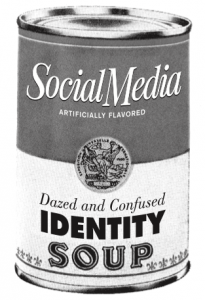Editor’s Note: This article concludes a two-part series on social media, begun with “Reading Charitably” by Laura Marshall [Issue 6: Self and Other]. We encourage you to read these pieces in conjunction, and conversation, with one another.
You Instagram a Pic-Stitched picture. You post a link to an outstanding article on Facebook with incisively clever commentary. You tweet a funny quote that you know will get some replies and retweets.
You wait a few minutes. Well, maybe you just wait a few seconds. Then you check back. The only comment is from someone trolling your political party or policy stance? Only one person has liked it? NO RETWEETS?!? How could this be?!? You’d spent a solid minute and a half, maybe TWO WHOLE MINUTES crafting that post. How has it not gotten more love?
Anyone who has more than one social media account and a smartphone has probably gone through this at least once. While most people’s social media neuroses don’t match mine, I’ve also had enough conversations with friends and read enough BuzzFeed posts about social media addiction to know these thoughts and feelings are more widespread than we are willing to admit.
Furthermore, statistics show that social media use on Facebook and other sites crosses every possible demographic boundary. Some common beliefs about social media use are correct: yes, women are five times more likely than men to use Pinterest. But then there are statistics that might surprise many in the upper class elite whose social media accounts reinforce already-existing biases about how the world works. Social networking rates, for example, are equal across all income levels.
With more people in all demographics using social media each day, all of our self-conceptions are increasingly shaped by the selfs we all portray online. Given this, to what extent do we allow the world of social media to define our self? Does social media affect our conception of reality more than it depicts actual reality?
It is fairly inarguable that social media does not depict the world as it really is. We flatteringly filter the picture on Instagram or, oftentimes, don’t post the bad pictures at all. We’re better looking, smarter, more civically minded, and more fun-loving on social media than we are in real life. In the social media world, George Costanza wouldn’t be tortured by his perfect come-back; he could post it to Facebook or Twitter at the stoplight on his way home as soon as it pops into his head. Even positive things like encouraging others become easier, quicker, more prevalent, and more superficial in the world of social media so that others can see it, like it, and share it.
Does all this mean social media itself is creating generations of narcissists? The truth about social media lies somewhere between the belief that is creating a new kind of human being (the “digital native”) and the claim that its effect on our interactions is ultimately negligible.
On the one hand, social media is not changing human nature. It is not transforming our tendency to put our best foot forward and hide our blemishes at every level. Nor is it altering our biases. Just like we read the news we are most likely to agree with and watch television shows that most likely reinforce our worldviews and values, what we see on Facebook, Twitter, and Instagram contributes to our preset schemas. Moreover, using any means necessary to control the image of ourselves that others see is nothing new. Haven’t we always “put on our best face” when we are in public? Don’t we all reserve our most vulnerable insecurities and secrets, keeping them hidden away from the general public? It is tempting to believe that social media merely enhances problems that have always existed, from the playground to the boardroom.
But we misdiagnose social media’s impact on our conceptions of self if we relegate it as just the newest medium through which we wrestle with our self-image problems. Social media, rather, could be enhancing and exacerbating tendencies that have always exist- ed, producing some negative outcomes in how we view ourselves and in how we think about others. For fallen humans already tending towards insecurity and su- perficiality, social media breaks down our fellowship with others into trending topics and Facebook likes. The result is that the creation of our self-image and identity is increasingly intentional and hyper-accelerated in a way that shapes both our understanding of the self and our relationships with others. Moreover, it creates the paradox of feeling lonelier than ever while also being connected to more people more often than ever before.
Some surveys of Facebook users showed slight increases in life satisfaction, social trust, civic engagement, and political participation. But other studies reveal a darker side mirroring the University of Michigan study Laura Marshall cited in “Reading Charitably,” with Facebook use leading to envy of others’ lives and producing worse self-images.
Whether we admit it to ourselves or not, social media makes us needier than ever, far outpacing the additional information and connectivity. The more information and connectivity we have, the more insecure we feel and the more obsessive we become. In this way, the new medium is the message, a message that enhances an age-old problem. We have more opportunities to compare ourselves to others. We have more opportunities to look in the mirror and see 100 percent of the gritty details of our own lives with only slivers of the lives of others.
So what do we do? Some suggest we disconnect altogether, a weak cop-out that would throw the baby out with the bathwater. Others, such as Kevin DeYoung at The Gospel Coalition, have suggested “social media fasts” or “tech-free retreats.” DeYoung cites a number of benefits: cutting the urge to offer endless commentary; recognizing how social media “does not encourage slow reflection or push us to the wisdom of the past”; remembering that the world goes on without you; and providing more time to live with the family and friends around you every day. Stepping away from social media also means less time roaming the Internet with no particular purpose and less time obsessing about our own images.
But are social media breaks taken at the point of burnout the healthiest way to live? If leaving Facebook and Twitter entirely wastes the potential benefits of the medium, and going through cycles of binging and purging is not sustainable, what do we do?
Like all distortions in our fallen world, these unique developments point us towards the solution to our oldest and newest problems—Christ’s sacrificial life, showing his love for us through his death on the Cross. We should do what we are called to do in all things. We should put it in perspective by laying it at the foot of the Cross. We should bend every minute of our daily schedule and every way we conceive of our self to the will of God. After all, our social media addictions and cycles of binging and purging point to something much deeper within us. We have a voracious appetite for people to like us and to match ourselves up against others. Even a gift given to us to connect with others and build our God-given inf luence for the Kingdom is warped to our fallen nature.
Realizing what social media is, how much time we waste on it, and ref lecting on and praying for an eternal perspective to remind us of what truly matters and not simply what is trending… that can and must come from God and his Word. And there is wisdom from Scripture that can easily be applied to our problems here.
We have long realized that the call to honor the Sabbath and keep it holy extends beyond regular intervals of physical rest from work. But in a modern era in which we are more likely to tire of constant connectivity than plowing the fields, perhaps Sabbath rest requires deliberate and regular respite from the exhaustive social media cycles that so clearly impact our self-image and how we view others. Recognizing the need to intentionally schedule breaks reveals better than anything else the full scope of our addictions and problems.
Abraham Kuyper’s notion of sphere sovereignty also provides a roadmap in applying Scripture to social media. The opportunities and problems of social media make it a unique sphere from other areas of our life, requiring appropriate and contextualized norms. To ensure our social media use conforms to Scripture and God’s lordship over our life, we need to take a serious look at how much time, energy, and thought we give to our online image. Some of us may need to track for a week how much time we spend online and what the opportunity cost of that is. For others, it may be prayerfully considering how we could use social media to dig deeper into friendships and intentionally (but not superficially) give glory to God.
In Sources of the Self: The Making of the Modern Identity, Charles Taylor discusses the ancient roots of our modern self-formation. He concludes by finding hope “implicit in Judeo-Christian theism… and… its central promise of a divine affirmation of the human.” With social media ever entrenching itself into every hour of our daily routine, we are past the point when we should start having serious conversations about how we can use social media to affirm the human within each of us and our thousands of friends online.
These conversations will require discipline, ref lection, and accountability. It turns out that the age-old problems of humanity found in our use of the newest technological media require returning to the age-old spiritual disciplines as well.













